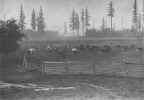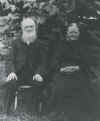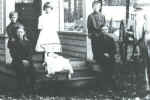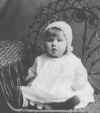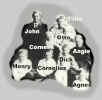|
by Henry Slotemaker Part Five---The Slotemaker Farm
In Nov. 1912 we moved into our new house. This house was to be home for us as a family for many years, as I am sure it was intended by our parents. Perhaps they had fond dreams of it continuing in the family for generations to come. As I reminisce and call to mind many of our family experiences, I find it impossible to present an objective account of the composite family objectives, plans, ambitions, disappointment, sorrows, frustrations and achievements. Perhaps you who grew to adulthood there will wish to add some reflections for the benefit of your posterity. However, some of the more important experiences, especially as they affected the entire family should be recorded here. In those days dairy and poultry farming was quite the general combination. Soon after moving into the new house, a brooder house for raising baby chicks, and a hen house for 200-300 egg producers were added to the home site. We continued using the old barn until 1916 when a new barn was built. Completing the building requirements for many years. The old barn was used for storage and housing young stock and hogs for some 30 additional years. After moving out to this farm we saw less of our
grandparents, although we did see them most Sundays. When Agnes
started school she stayed with Grandpa and Grandma during the school
week, coming home on Friday and returning on
In June 1914 Dad was a delegate to the Synod of the C.R.C. held in Grand Rapids, Mich. This also gave him the opportunity to visit his old home in Iowa with relatives and friends there. The third event taking place in 1914 that required attention is the death of Grandma Slotemaker in November. Her death was the first in the family circle since coming to Lynden. She was 75 years old. Little need be said about Grandma’s life that is not already recorded in the foregoing. Her influence lay not so much in the things she initiated as in the way she responded to what others did. We all loved her for her quiet unassuming personality, and her love that was so evidently a reflection of her Christian faith. This left Grandpa living alone. I do not know how long he continued alone but at least the last 2 or 3 years of his life he spent the winters at the Spaan home, and the summers with us. This continued until November or December 1919 when Grandpa also left this earthly scene and joined Grandma in the heavenly mansions. He was 80 years old. Both grandparents died of what was then simply called "old age", a gradual depletion of ones energy resources, like a candle running out of fuel, the spirit leaves the worn out body. Their death marked the passing of the first generation of a family circle in America. Theirs was a colorful, eventful and adventurous period in history. They filled a small niche scarcely observed outside of their family circle and community. We, their posterity, do well to emulate the motivating principles that they lived by: their Christian convictions. A couple of incidents will illustrate what I mean. 1. We had neighbors who were repeatedly guilty of vandalism and theft. Grandpa advised us not to have them arrested. They would only take revenge. You can win them only by love. 2. During World War I people were assessed in a certain amount – supposedly according to income – which was to be invested in "Liberty Bonds" with which the war was financed. Grandpa’s conviction that international differences should be settled without war was so firm, he refused to make any contribution to the war by the purchase of bonds, he contributed to the Red Cross instead. The drive committee respected his position, and accepted his contribution.
In the spring of 1917 Jessie, now 3 years of age had measles. As sometimes happens with measles, it leaves an after-effect. This happened with Jessie. She did not regain normal health. She tired easily and complained about pain in joints, especially the knees. Medication may have given some relief but no cure. The disease did not progress noticeably during the summer. Since Mother’s previous visit to Iowa when Agnes was a year old Grandpa Kramer had died, and grandma had remarried. With grandma’s advancing age, and the regular correspondence stimulating the desire, and having another little girl to accompany her, the decision was made that mother should make another visit to relatives in Iowa, which she did in early September, taking Jessie with her. As Neal and I were now both out of school, Dad and we two performed a 3-way bachelors act for the nearly 2 months that Mother and Jessie were away. Agnes, Dick and Otto stayed with relatives; Dick at Spaans, and Agnes and Otto with the Van Zwol family who were then living on our former place on the river.
Meanwhile World War I was raging on. Perhaps this fact made our family grief less severe when compared with those who suffered war casualties. As the year 1918 was wearing on, and a war-weary world was trying to see the purpose of it all, another tragedy struck the world. The Spanish influenza epidemic was gradually covering the earth and beginning to take more lives than the war, hitting perhaps the hardest in military camps. This was an enemy against which men had no defensive weapon, and struck with equal force of both sides of the battle lines as well as on the home front. It seems as if God on his celestial throne was showing men the futility of their mechanical weapons as compared with a microscopic virus over which He alone had control. When the "flu" epidemic was still a long distance from us the reports of the many deaths struck fear in us as we knew it was sure to reach here also. As it came nearer the fear subsided and we became reconciled to the inevitable. In our family devotions we were constantly reminded of the providence of God and our dependence on Him which also gave peace of mind. Finally, during the week of Thanksgiving day our family too came down with it: all but Mother who seemed to have a natural immunity to all communicable diseases, having been exposed to measles and mumps on various occasions, also to smallpox, diphtheria and scarlet fever, but she never had any of them. Her early practical nursing experience was put to good use while we were all sick.. Mustard plaster was about the only treatment used plus warmth and plenty of liquids. With the help of one of the neighbors we somehow struggled through the chores. The weather was very mild and we all came through without harm. In the meantime on Nov.11, 1918, the armistice had been signed, and the nations were no longer at war. At the ages of 11 and 9 respectively, Neal and I were initiated in the chore of milking, thereby making a vital contribution to the family economy. Then, as now, it was the response to this chore of milking that was the primary deciding factor as to whether farm boys would continue in the family occupation. Apparently we did our jobs quite well, as we were soon given greater responsibilities. Neal, still the more aggressive one was soon more impressed with the disadvantages of farm chores than with the advantages as regular employment. Trapping fur bearing animals appealed to him so he acquired a few traps. Muskrats inhabited the marshes and ditches so he soon had a pretty good thing going. If a skunk or mink made the mistake of getting caught in a muskrat trap, that was no offence to Neal. It added a little color and odor to the proceedings, as well as more cash for the pelts. We had an arrangement between us that if I would do more of the farm chores, we would share the net earnings from the sale of the pelts. With these funds we bought bicycles, sporting goods, etc. As there was an abundance of both upland game birds and water fowl we soon took to hunting. With hunting, fishing, and trapping to balance up farm work we had quite a wide range of activity. Footnotes 1. Howard Spaan tell us that he remembers his cousins always called Cornelius 'Uncle Neil', but Howard's Dad, Henry, and Howard's two uncles always called Cornelius by the nickname 'Case', rather than Neil. Why has been lost to the mists of time, unless someone comes forward with the explanation. 2. There is some dispute as to Henry's mention of the cause of death for little Jessie.
It is believed she died not from tuberculosis, but from spinal meningitis. Georgi
Figenbaum had spinal meningitis when she was 11 years old and Georgi's
grandma, Tillie, wrote a letter to Georgi's mother, the second Jessie,
saying that she cried for Georgi since her dear little Jessie died of that disease and was fearful Georgi would die from
it too. Thanks to penicillin, Georgi made a near complete recovery.
Jessie II passed that letter from Tillie onto Georgi; however, Georgi
has been unable to locate it. Georgi's sister, Virginia (aka Ginnie
Mae) also remembers talking with her grandma (Tillie) about the cause
of Jessie I's death and confirms being told it was from spinal
meningitis, not tuberculosis. Continue to Part 6---1918-1964
|
